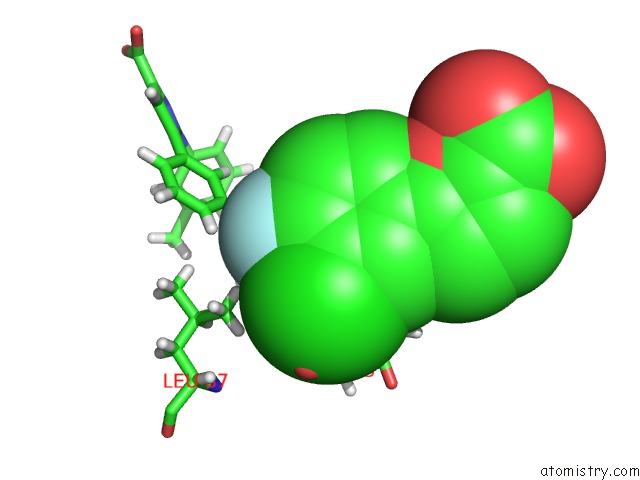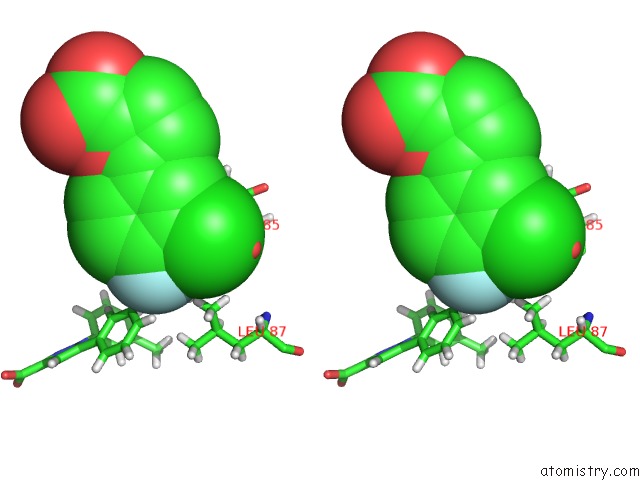Chlorine »
PDB 4lr4-4lxd »
4luv »
Chlorine in PDB 4luv: Fragment-Based Discovery of A Potent Inhibitor of Replication Protein A Protein-Protein Interactions
Protein crystallography data
The structure of Fragment-Based Discovery of A Potent Inhibitor of Replication Protein A Protein-Protein Interactions, PDB code: 4luv
was solved by
M.D.Feldkamp,
A.O.Frank,
J.P.Kennedy,
A.G.Waterson,
E.O.Olejnczak,
N.F.Pelz,
J.D.Patrone,
B.Vangamudi,
D.V.Camper,
O.W.Rossanese,
S.W.Fesik,
W.J.Chazin,
with X-Ray Crystallography technique. A brief refinement statistics is given in the table below:
| Resolution Low / High (Å) | 38.03 / 1.40 |
| Space group | P 21 21 21 |
| Cell size a, b, c (Å), α, β, γ (°) | 37.971, 53.528, 54.046, 90.00, 90.00, 90.00 |
| R / Rfree (%) | 13.9 / 17 |
Other elements in 4luv:
The structure of Fragment-Based Discovery of A Potent Inhibitor of Replication Protein A Protein-Protein Interactions also contains other interesting chemical elements:
| Fluorine | (F) | 1 atom |
Chlorine Binding Sites:
The binding sites of Chlorine atom in the Fragment-Based Discovery of A Potent Inhibitor of Replication Protein A Protein-Protein Interactions
(pdb code 4luv). This binding sites where shown within
5.0 Angstroms radius around Chlorine atom.
In total only one binding site of Chlorine was determined in the Fragment-Based Discovery of A Potent Inhibitor of Replication Protein A Protein-Protein Interactions, PDB code: 4luv:
In total only one binding site of Chlorine was determined in the Fragment-Based Discovery of A Potent Inhibitor of Replication Protein A Protein-Protein Interactions, PDB code: 4luv:
Chlorine binding site 1 out of 1 in 4luv
Go back to
Chlorine binding site 1 out
of 1 in the Fragment-Based Discovery of A Potent Inhibitor of Replication Protein A Protein-Protein Interactions

Mono view

Stereo pair view

Mono view

Stereo pair view
A full contact list of Chlorine with other atoms in the Cl binding
site number 1 of Fragment-Based Discovery of A Potent Inhibitor of Replication Protein A Protein-Protein Interactions within 5.0Å range:
|
Reference:
A.O.Frank,
M.D.Feldkamp,
J.P.Kennedy,
A.G.Waterson,
N.F.Pelz,
J.D.Patrone,
B.Vangamudi,
D.V.Camper,
O.W.Rossanese,
W.J.Chazin,
S.W.Fesik.
Discovery of A Potent Inhibitor of Replication Protein A Protein-Protein Interactions Using A Fragment-Linking Approach. J.Med.Chem. V. 56 9242 2013.
ISSN: ISSN 0022-2623
PubMed: 24147804
DOI: 10.1021/JM401333U
Page generated: Fri Jul 11 18:45:47 2025
ISSN: ISSN 0022-2623
PubMed: 24147804
DOI: 10.1021/JM401333U
Last articles
Cl in 8B91Cl in 8B90
Cl in 8B8Y
Cl in 8B7Z
Cl in 8B8X
Cl in 8B8H
Cl in 8B82
Cl in 8B7C
Cl in 8B7W
Cl in 8B56